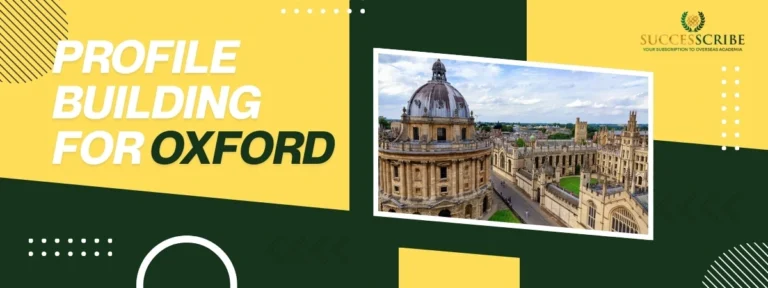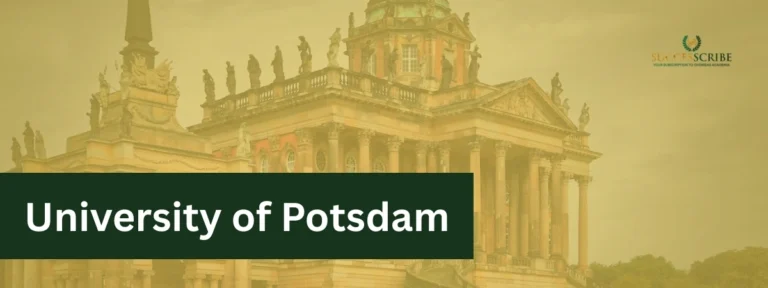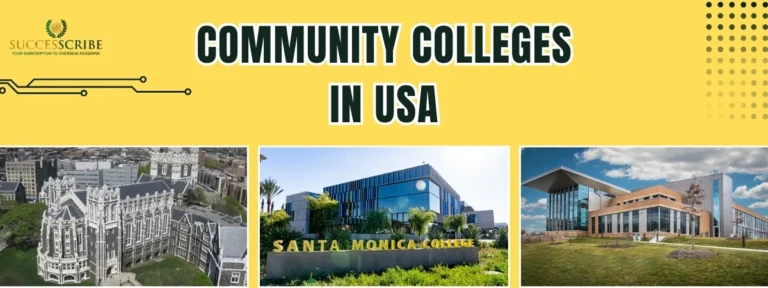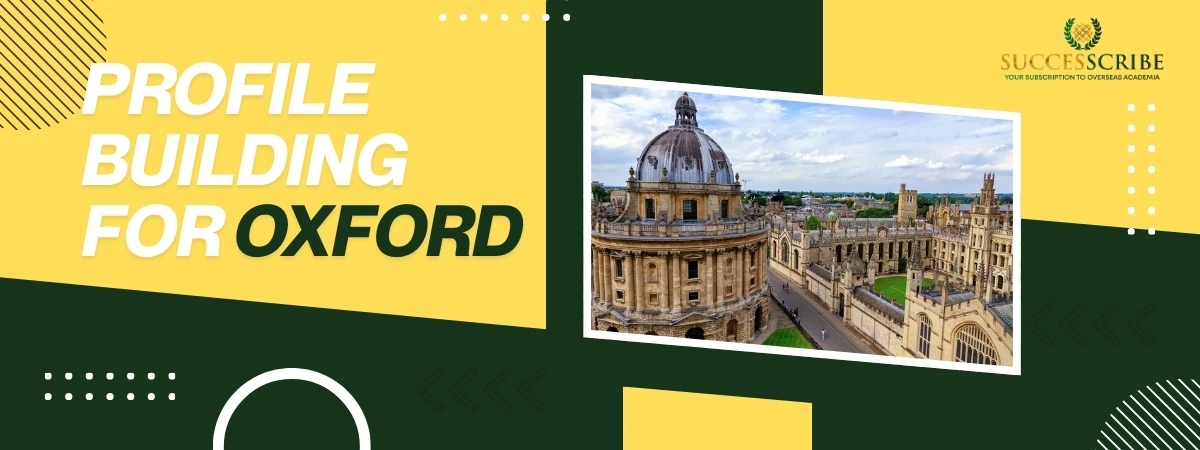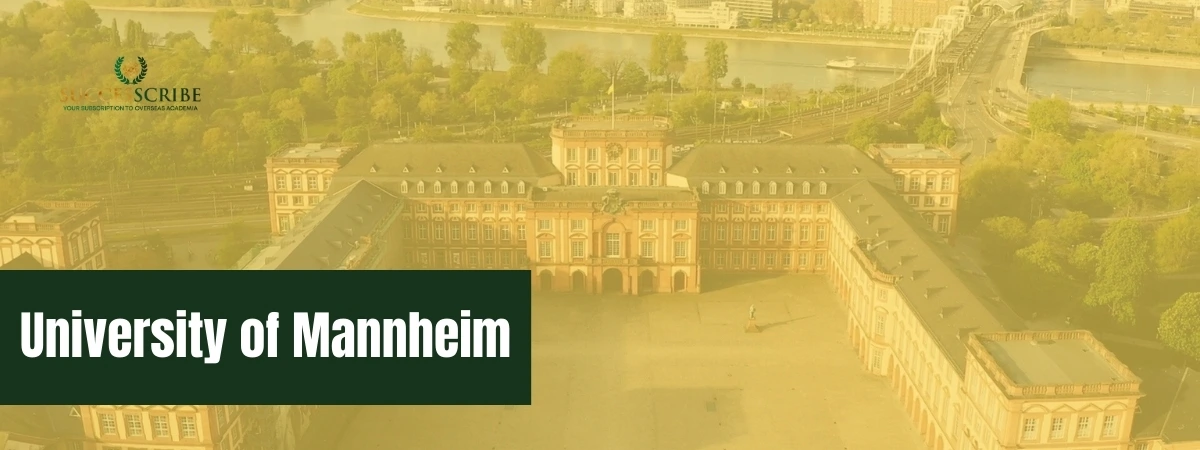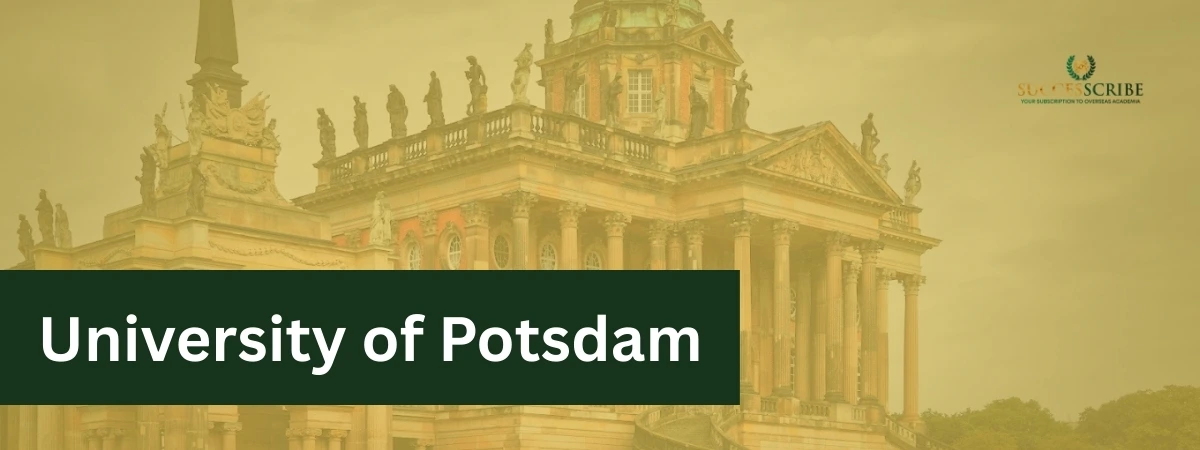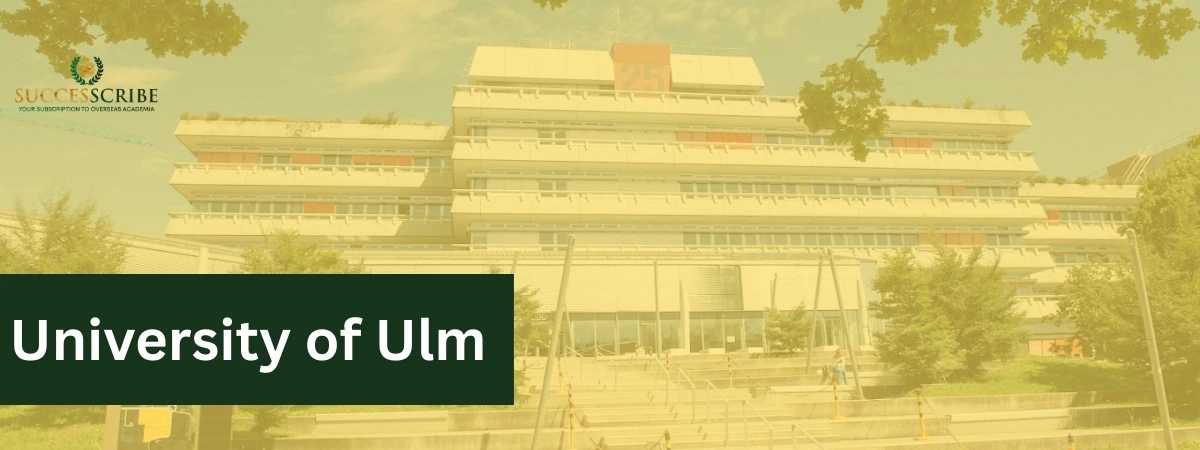An Executive MBA (EMBA) is a specialized graduate-level degree designed explicitly for experienced working professionals, leaders, and managers who aim to enhance their management expertise without interrupting their careers. Unlike a traditional MBA, which is often pursued by recent graduates or early-career professionals, the EMBA targets mid to senior-level professionals who typically have significant work experience, often ranging from 5 to 15 years or more. The return on investment (ROI) for an Executive MBA in USA remains compelling. Graduates often experience a 40-60% salary boost within three years, with average annual ROI hovering around 12-15%, per Bloomberg’s analysis.
Key Highlights – Executive MBA in USA
| Feature | Highlight |
| Target Audience | Designed for mid- to senior-level professionals with 8–15 years of work experience and strong leadership potential. |
| Program Duration | Typically 18–24 months, with flexible weekend, modular, or global immersion formats. |
| Top Universities | Wharton, Kellogg, MIT Sloan, Columbia, NYU Stern, University of Chicago Booth, University of Michigan Ross, Duke Fuqua. |
| Tuition & Cost | $160,000–$240,000, varying by school, program length, and global modules. |
| Return on Investment (ROI) | High ROI; post-EMBA salary increases by 40–60%, recouping investment in 3–5 years. |
| Career Outcomes | Rapid progression to C-suite roles (CEO, CFO, COO), senior management, entrepreneurship, consulting, and global leadership positions. |
Executive MBA vs. MBA in the USA: Key Differences

Choosing between an Executive MBA (EMBA) and a traditional MBA in the USA can be a pivotal decision in your career. While both programs aim to develop business leadership skills, they cater to different professional profiles and career goals. Here’s a detailed comparison:
| Feature | Executive MBA (EMBA) | MBA |
| Target Audience | Designed for mid- to senior-level professionals with significant managerial experience. | Primarily aimed at early- to mid-career professionals looking to accelerate their career or shift industries. |
| Work Experience Requirement | Typically 8–15 years, including at least 5 years in a leadership role. | Usually 2–5 years of work experience; some programs accept fresh graduates. |
| Program Duration | 18–24 months, often with flexible schedules like weekends or modular formats. | 20–36 months, mostly full-time with a structured weekday schedule. |
| Learning Format | Weekend classes, evening sessions, online modules, and global immersions to accommodate working professionals. | Full-time, on-campus programs with standard classroom schedules; some part-time or online options exist. |
| Focus of Curriculum | Emphasizes strategic leadership, executive decision-making, global business, and networking among peers with extensive experience. | Covers foundational business concepts, case studies, and specializations; focuses more on technical and functional skills. |
| Class Profile | Experienced executives with diverse industry backgrounds, often with leadership positions. Average age: 35–45 years. | Mix of recent graduates and young professionals. Average age: 25–30 years. |
| Networking Opportunities | Extremely strong peer network of senior professionals, industry leaders, and entrepreneurs. | Good network, but less experienced peers compared to EMBA cohorts. |
| Cost | Higher tuition due to targeted executive-level learning and global exposure. Approx. $75,000–$230,000. | Typically lower than EMBA. Approx. $50,000–$120,000. |
| Return on Investment (ROI) | High ROI due to immediate career advancement, salary hikes, and leadership opportunities. Average post-EMBA salary: $175,000–$381,000. | Moderate ROI; strong potential for growth, especially for career switchers. Average post-MBA salary: $100,000–$120,000. |
| Career Outcome | Rapid progression to C-suite roles (CEO, CFO, COO), entrepreneurship, or senior management positions. | Career acceleration, lateral industry moves, or entry into mid-level management roles. |
| Global Exposure | Often includes international residencies, study trips, and global business modules. | Some programs offer exchange programs or international projects, but less frequent than EMBA. |
Suggested Post:
Top Universities and Colleges for Executive MBA in the USA
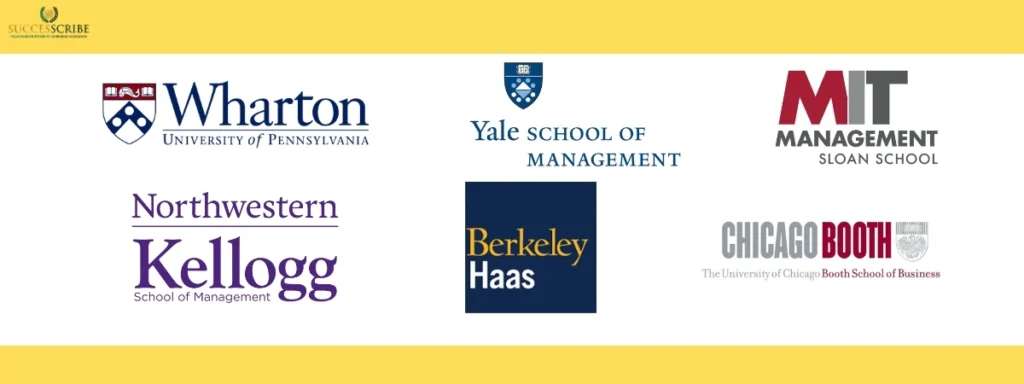
The United States hosts several prestigious Executive MBA (EMBA) programs that cater to experienced professionals seeking to enhance their leadership skills and advance their careers. Enrolling in an Executive MBA in USA at these prestigious schools connects you with elite peers and unlocks international leadership opportunities.
1. University of Pennsylvania (Wharton)
| Feature | Details |
| Program | Wharton Executive MBA |
| Average Work Experience | 12+ years |
| Duration | 22-24 months |
| Format | Weekend + Global Immersion |
| Tuition / Total Cost | US$ 230,100 (estimated for full program) |
| Notes / Key Highlights | One of the most expensive but highly ranked; strong global exposure; top employer reputation. |
2. Northwestern University (Kellogg)
| Feature | Details |
| Program | Kellogg Executive MBA |
| Average Work Experience | 14 years |
| Duration | 24 months |
| Format | Weekend + Global Modules |
| Tuition / Total Cost | US$ 236,958 (approx) |
| Notes / Key Highlights | Strong in leadership, global management; high employer reputation. |
3. Yale School of Management
| Feature | Details |
| University | Yale University (School of Management) |
| EMBA Program | Yes |
| Duration | 22 months |
| Format | Core + Electives + Global Network Week etc. |
| Tuition / Total Cost | US$ 216,840 |
| Notes / Key Highlights | Diverse cohort, strong in career outcomes; good reputation. |
4. UC Berkeley (Haas)
| Feature | Details |
| University | University of California, Berkeley (Haas) |
| EMBA Program | Yes |
| Duration | 22 months |
| Format | Global immersions/modules included |
| Tuition / Total Cost | US$ 205,897 |
| Notes / Key Highlights | Known for innovation, strong connections to Bay Area tech and entrepreneurship. |
5. Massachusetts Institute of Technology (MIT) – Sloan School of Management
| Feature | Details |
| Program | MIT Sloan Executive MBA |
| Duration | 20 months (classes every 3 weeks, Friday–Saturday) |
| Average Work Experience | 17 years |
| Tuition | $192,000 |
| Key Highlights | Tech-driven leadership, strong focus on innovation and entrepreneurship |
6. University of Chicago (Booth)
| Feature | Details |
| Program | Chicago Booth Executive MBA |
| Average Work Experience | 13 years |
| Duration | 21-22 months |
| Format | Includes international/global sessions/modules |
| Tuition / Total Cost | US$ 210,500 |
| Notes / Key Highlights | Strong quantitative focus; highly reputed finance, global networks. |
7. NYU Stern School of Business
| Feature | Details |
| Program | Stern Executive MBA |
| Average Work Experience | 14 years |
| Duration | 22 months |
| Format | Modular formats + global residencies/modules |
| Tuition / Total Cost | US$ 219,500 |
| Notes / Key Highlights | Strong in finance/media; NYC location is a plus. |
8. UCLA Anderson School of Management
| Feature | Details |
| University | University of California, Los Angeles (Anderson) |
| EMBA Program | Yes |
| Duration | 22 months |
| Format | Weekend or module based format with global components |
| Tuition / Total Cost | US$ 192,720 |
| Notes / Key Highlights | Good west-coast choice; strong employer reputation. |
9. Cornell University (Johnson)
| Feature | Details |
| University | Cornell University (Johnson) |
| EMBA Program | Yes |
| Duration | 22 months |
| Format | Has executive modules; global exposure implied |
| Tuition / Total Cost | US$ 186,510 |
| Notes / Key Highlights | Good reputation, strong networks, slightly lower cost than top-tier peers. |
10. University of Texas at Austin (McCombs)
| Feature | Details |
| University | University of Texas at Austin (McCombs) |
| EMBA Program | Yes |
| Duration | Information: around similar 20-24 months range |
| Format | Executive format with global/business modules |
| Tuition / Total Cost | US$ 162,000 |
| Notes / Key Highlights | More affordable among top programs; good regional reputation. |
11. Columbia University – Columbia Business School
| Feature | Details |
| Program | Columbia Executive MBA |
| Duration | 20–24 months |
| Average Work Experience | 10–12 years |
| Tuition | $233,500 |
| Key Highlights | New York City location, Ivy League reputation, flexible Friday/Saturday and weekend formats |
12. University of Michigan – Ross School of Business
| Feature | Details |
| Program | Michigan Ross Executive MBA |
| Duration | 21 months |
| Average Work Experience | 15 years |
| Tuition | $183,500 |
| Key Highlights | Two locations (Ann Arbor and Los Angeles), strong leadership and strategy modules |
13. Duke University – Fuqua School of Business
| Feature | Details |
| Program | Duke Global Executive MBA |
| Duration | 18–22 months |
| Average Work Experience | 10–15 years |
| Tuition | $165,000 |
| Key Highlights | International residencies in Asia, Europe, and Latin America, strong global perspective |
Suggested Post: SOP for MBA in USA
Eligibility Criteria for Executive MBA in USA B-Schools
Unlike a regular MBA, the Executive MBA (EMBA) is designed for professionals who already have years of experience and are looking to move into senior leadership roles. Each U.S. business school has its own requirements, but the common eligibility criteria are:
1. Work Experience
- Requirement: 8–15 years of professional experience (varies by school).
- Why important? EMBA programs are highly discussion-based. Schools expect you to bring real-world insights from your career into the classroom.
- Example: Wharton requires 12 years on average; MIT Sloan’s EMBA students have 17 years.
2. Current Employment
- Requirement: Most EMBA programs expect candidates to be employed while studying.
- Why important? Courses are designed for working executives, and many assignments are tied to real business challenges at your workplace.
3. Educational Background
- Requirement: A bachelor’s degree (or equivalent) from a recognized university.
Notes:
- The degree can be in any field (engineering, business, IT, medicine, etc.).
- Some schools may accept applicants without a bachelor’s degree if they have exceptional professional achievements.
4. Leadership Experience
- Requirement: Demonstrated leadership or management experience (team management, project leadership, or entrepreneurial roles).
- Why important? EMBA is about preparing executives for C-suite roles (CEO, CFO, COO, etc.), so schools want evidence of your leadership potential.
5. GMAT/GRE (Often Waived)
- Many U.S. EMBA programs waive GMAT/GRE if you have significant work experience.
Instead, they may require:
- An internal assessment test, or
- Strong academic/professional record.
Example: Columbia, Kellogg, and MIT Sloan often waive standardized test requirements.
6. English Proficiency (For International Students)
- Requirement: TOEFL or IELTS scores (if your undergraduate degree wasn’t in English).
Typical Scores:
- TOEFL iBT: 100+
- IELTS: 7.0+
7. Letters of Recommendation
- Requirement: Usually 2–3 recommendation letters.
- Who should write them? Supervisors, senior managers, or clients who can vouch for your leadership, achievements, and growth potential.
8. Statement of Purpose / Essays
- Requirement: Personal essays explaining your career journey, why you want an EMBA, and your future leadership goals.
- Why important? Schools use these essays to judge your motivation and whether you’re a good fit.
9. Interview
- Requirement: Shortlisted applicants are invited for an interview (online or in person).
- Focus: Leadership qualities, career achievements, and readiness for an intensive program.
Cost of Executive MBA in the USA
The cost of an Executive MBA program in the USA varies:
- Top-Tier Programs: $200,000–$230,000
- Mid-Tier Programs: $150,000–$200,000
- Affordable Options: $100,000–$150,000
Scholarships for Indian Students Pursuing EMBA in the USA
Pursuing an Executive MBA in USA can be a life-changing step for Indian professionals, but the cost of tuition and living expenses can be significant. To support talented candidates, many U.S. business schools and external organizations offer scholarships specifically for international students, including Indians. These scholarships can cover partial or full tuition, living expenses, travel, and other fees, making it more feasible for deserving candidates to access world-class EMBA programs.
1. Stanford Reliance Dhirubhai Fellowship
- Offered by: Stanford Graduate School of Business
- Amount: Up to $95,000 (₹7.8 million)
- Coverage: Tuition, living expenses, and health insurance
- Eligibility: Indian nationals with financial need and a strong commitment to contributing to India’s development
2. Fulbright-Nehru Master’s Fellowship
- Offered by: United States-India Educational Foundation (USIEF)
- Amount: Full tuition, airfare, living stipend, and health insurance
- Eligibility: Indian citizens with a minimum of three years of professional experience and a strong academic record
3. Inlaks Shivdasani Foundation Scholarships
- Amount: Up to $100,000 (₹83 lakh)
- Coverage: Tuition and living expenses
- Eligibility: Indian nationals under 30 with exceptional academic and extracurricular achievements.
4. Tata Scholarship Fund for Cornell University
- Offered by: Cornell University
- Coverage: Full tuition and living expenses
- Eligibility: Indian nationals with a strong academic record and financial need
5. Donald P. Jacobs International Scholarships – Kellogg School of Management
- Offered by: Northwestern University’s Kellogg School of Management
- Coverage: Partial tuition awards
- Eligibility: International students admitted to Kellogg’s EMBA program
6. External Scholarships for Indian Students
- Goldman Sachs MBA Fellowship: Provides financial support to students from underrepresented backgrounds pursuing an MBA in the USA.
- Knight-Hennessy Scholars Program: Offers full funding for graduate study at Stanford University, including EMBA programs.
- EducationUSA Funding: Provides information on various scholarships and financial aid options for international students.
Suggested Post: Scholarships for Masters in USA
Career Opportunities & ROI After Executive MBA in the USA
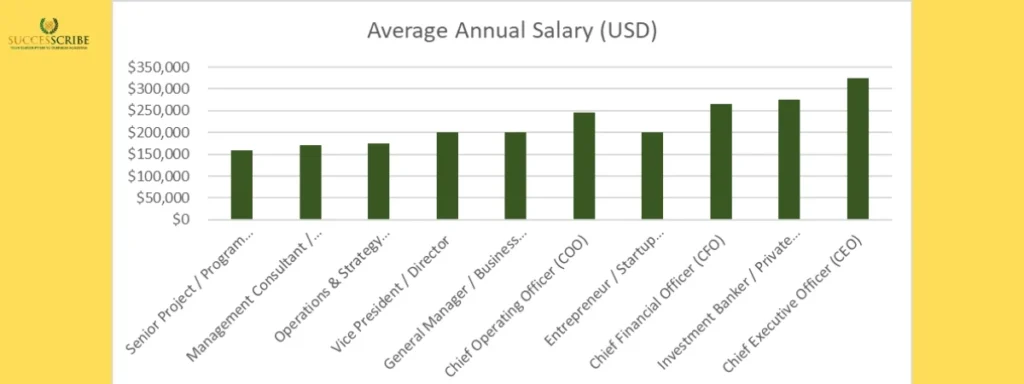
Pursuing an EMBA in the USA opens doors to senior leadership roles, strategic positions, and global opportunities. Professionals gain advanced managerial skills, leadership expertise, and a strong network, which often results in a significant salary increase and career growth. The return on investment (ROI) is usually high because the salary boost post-EMBA can outweigh the cost of the program within a few years. Graduates of an Executive MBA in USA often secure C-suite positions, senior management roles, or entrepreneurial ventures across industries like finance, tech, and healthcare.
Roles and Career Paths
Post-EMBA, professionals often pursue roles such as:
- Chief Executive Officer (CEO)
- Chief Financial Officer (CFO)
- Chief Operating Officer (COO)
- Managing Director
- Entrepreneur/Founder
- Strategy Consultant
- Investment Banker
These roles span various industries, including finance, technology, healthcare, and manufacturing.
Salary Packages
Salaries for EMBA graduates vary based on industry, location, and experience:
- Technology Sector: $200,000–$350,000+
- Finance Sector: $250,000–$400,000+
- Healthcare Sector: $180,000–$300,000+
- Consulting Firms: $220,000–$350,000+
| Career Path / Role | Average Annual Salary (USD) | Growth Prospects | ROI Insights |
| Chief Executive Officer (CEO) | $200,000 – $450,000+ | High; often top leadership roles | ROI is very high; EMBA equips leaders for C-suite positions |
| Chief Financial Officer (CFO) | $180,000 – $350,000 | High; strategic leadership in finance | EMBA improves strategic finance skills, increasing salary potential |
| Chief Operating Officer (COO) | $170,000 – $320,000 | High; operational leadership roles | ROI is strong; EMBA experience translates to operational efficiency leadership |
| General Manager / Business Unit Head | $150,000 – $250,000 | Moderate to high; P&L responsibility | EMBA enables promotion to strategic roles faster |
| Management Consultant / Senior Consultant | $120,000 – $220,000 | High; promotion to partner/director roles | ROI is significant as EMBA enhances consulting strategy and leadership |
| Entrepreneur / Startup Founder | $100,000 – $300,000+ | High; depends on business success | ROI varies; EMBA provides network and strategic skills critical for growth |
| Vice President / Director | $140,000 – $260,000 | High; leadership trajectory | EMBA accelerates promotion opportunities and salary growth |
| Senior Project / Program Manager | $120,000 – $200,000 | Moderate; leads to director/VP roles | EMBA improves management skills, increasing eligibility for senior roles |
| Investment Banker / Private Equity Professional | $150,000 – $400,000+ | High; top-level finance roles | ROI is substantial in high-paying finance roles |
| Operations & Strategy Consultant | $130,000 – $220,000 | High; opportunity to move into executive leadership | EMBA enhances strategic decision-making, improving promotion prospects |
Conclusion
An Executive MBA in USA is a strategic investment for experienced professionals aiming for senior leadership and global career growth. Top U.S. business schools provide world-class education, international exposure, and strong alumni networks, empowering executives to make impactful business decisions.
With significant career opportunities, attractive salary packages, and high ROI, pursuing an EMBA in the USA helps professionals accelerate their career trajectory. Scholarships and financial support make it more accessible for Indian students, allowing them to gain a prestigious degree while minimizing financial burden.
FAQs
How long does it take to complete an Executive MBA in USA?
Most EMBA programs are 18–24 months in duration, with classes scheduled on weekends, evenings, or modular formats to accommodate working professionals.
Can I pursue an EMBA in the USA while working full-time?
Yes. EMBA programs are specifically designed for working executives, with flexible schedules such as weekend classes, online modules, and international residencies.
Which are the top universities offering Executive MBA in the USA?
Top U.S. universities with EMBA programs include:
1. Wharton School, University of Pennsylvania
2. Kellogg School of Management, Northwestern University
3. MIT Sloan School of Management
4. Columbia Business School
5. NYU Stern School of Business
6. University of Chicago Booth
7. University of Michigan Ross
8. Duke Fuqua School of Business
What is the eligibility criteria for Executive MBA programs in the USA?
Common eligibility requirements include:
1. 8–15 years of professional work experience
2. Bachelor’s degree from a recognized university
3. Leadership or managerial experience
4. English proficiency (TOEFL/IELTS for international students)
5. Letters of recommendation and essays
How is an Executive MBA different from a regular MBA in the USA?
The key differences include:
Work Experience: EMBA candidates usually have 8–15 years of professional experience; MBA candidates typically have 2–5 years.
Schedule: EMBA programs are often part-time or weekend-based to accommodate working professionals.
Curriculum Focus: EMBA emphasizes leadership, strategic thinking, and practical application in the workplace.
Related Post
MBA in business analytics in USA
MBA in USA without work experience
MBA scholarship in USA
MBA salary in USA


